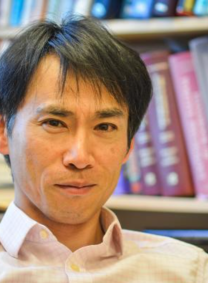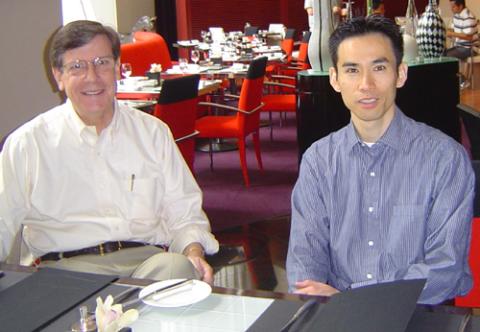Researching psychological well-being -- and the societies that foster it
Professor Shigehiro Oishi discusses his career thus far and what’s next at UChicago
By Aubrey Christofersen
Now the Marshall Field IV Professor in the Department of Psychology, Shigehiro Oishi’s interests in studying happiness first stirred when he was an undergraduate in Japan.
“I was thinking about what kind of career I wanted to pursue and what, maybe 20 or 30 years down the road, might make me happy,” says Oishi.
In his last year of undergraduate study, Shige found himself researching burnout in Japanese businessmen.
“My senior thesis was essentially about mid-life crises,” he says. Oishi found himself doing his first research into the psychology of happiness, trying to figure out why some of these men “were clearly having mid-life crises, while others were doing fine.”
But as his undergraduate research progressed, Oishi noticed a limitation in the literature: there wasn’t very much of it.
“I thought there would have been so many people who studied happiness, but psychologists in the mid-20th century didn’t think it was empirically investigable,” he says.
Of the few psychology publications studying happiness, one professor at the University of Illinois was a leader in the field. Professor Ed Diener was, in Oishi’s words, “nearly the only person back then studying happiness.”
“Luckily I found a mentor who was one of the few psychologists studying it at the time, so I was able to do my PhD on happiness,” says Professor Oishi. At Illinois, he found in Professor Diener not just an advisor but a “mentor” who could support his unique research interests.
Oishi recalls Diener’s research arc, explaining the state of well-being research at the time. “As a student, Diener told his advisor he wanted to research the happiness of farmers,” he says, “but his advisor told him that he couldn’t study such things in psychology.” Instead, he was pushed to research conformity. Later in his career, Diener found a way to back to happiness.
“After he received tenure, he started researching happiness,” Oishi says, “which he had wanted to do ever since his undergraduate days.” That sense of trajectory over one’s career stayed with Oishi.
Measuring Well-Being
“Once psychologists became interested in happiness, they started testing how valid the measures already used survey researchers were,” says Oishi. With colleagues including Diener at Illinois, Shige joined the project of figuring out if, and how, psychologists could effectively study happiness.
A primary way happiness had been previously studied was through self-reports, where subjects assess their own feelings in general, rating their happiness on a scale of 1-10.
“The question psychologists asked”, says Oishi, “was ‘How can we make sure the measure is reliable, and valid?’” Comparing self-reports to assessments made by family, friends, spouses, and others, the researchers tested to see if peer observations would converge with those of a person self-reporting.
“We did a lot of self-report versus peer report work,” says Oishi, “and we quickly figured out that parental reports are not great–they just massively overestimate children’s happiness–but spousal reports and friend reports are pretty good, they converge with self-reports.”
One notable finding in measuring happiness was the difference between moment-to-moment measures of self-reports and later recollections of how people felt. Oishi recalls Diener’s work investigating memory, where students going on spring break were asked to evaluate their feelings at points during the trip, and then recollect later when they returned and decide if they’d be willing to revisit. Rather than reports during the trip, it was instead the students’ memory and recollection of events that better predicted their decision.
In his own work, too, Professor Oishi investigated this effect, finding in one study that couples’ retrospective judgement of their satisfaction in relationships was a better indicator of their longevity than their day-to-day feelings. “It’s not just random moment-to-moment happiness but how we remember the relationship, trip, occupation, etc. that affects our decisions,” says Oishi.
Ultimately, after years of hard work, research, and writing, Oishi and other psychologists in the field had their finding, one which would help establish the scientific viability of happiness research. In Professor Oishi’s words, “Self-reports are actually pretty good measures of happiness!”
Culture
When he first came to the United States as a graduate student, Oishi noticed that many of the papers he was reading seemed unusual to him.
“Because I grew up in Japan, most of the happiness research here in the US sounded a little different,” says Oishi, noting that “what makes typical Americans happy and proud are not the same that would make Japanese people feel happy.”
Inspired to investigate these differences, he decided to look towards the cultural determinants of happiness. “What’s different is how they remember,” says Oishi, “we learned that individual differences, personality effects, as well as this cultural effect come into play.”
As an example, Oishi conducted a study, the findings of which indicated that American students’ recollections of past weeks tended to be “predicted by how good the best day was.” “But,” he says, “when we looked at the Asian students, it wasn’t just the best day, but how bad the worst day was – both predicted the overall judgement.”
What’s next?
“For the first ten years or so starting in the ‘80s, psychologists really focused on happiness,” says Oishi, “but in the ‘90s, some people started criticizing this – asking, ‘Is happiness everything in well-being?’” Oishi and other psychologists began looking at meaningfulness of life, which might be exhibited by people with purpose and accomplishment, or with a strong sense of spirituality that guides them. “For a long time it became this debate of, ‘Is it more important for someone to feel happy, or to feel like their life has meaning?’” says Oishi.
“For fifteen years or so we debated fiercely,” he says, “but of course both are important.” In general, happiness and a meaningful life seem to map closely to each other, but just as with studies in happiness, cultural differences begin to emerge from a larger, global view.
“When you look at a worldwide scale, there are some distinctions,” says Oishi. For instance, Oishi says, “people in extreme poverty may find meaning in their lives even though they are not happy, through religion or other means.” In richer countries like America, however, “people might have a sort of CEO mindset: they want to use their resources to make a difference and find meaning in that way.”
While studying happiness and meaning, Oishi identified another facet not yet explored by psychologists. “I found myself asking, ‘If you have happiness and you have meaning, is this a full life?’ and I couldn’t say, ‘Yes,’” he says. “I felt like something was missing.” Reading novels and obituaries, he encountered descriptions of people whose lives were not necessarily happy, nor were they even quite meaningful, and yet, still, they had admirable lives in terms of experience–of richness. “Often these were artists,” he says, “rather than conformity, accumulation of wealth, or even trying to make a positive impact on the world, these people were so into their own craft.”
Psychological richness is the newest tenet of Oishi’s research into well-being, and one that he hopes to expand at UChicago. Much the same way that he moved from individual happiness and individual meaning to the cultural and societal determinants, Shige hopes to turn to examining which societies allow citizens to have “psychologically, really rich lives.”
Here, Oishi plans to continue research on what makes a society happy and allows people within them to lead meaningful lives, questions he says he hasn’t completely answered.
In deciding to come to UChicago from UVA, where he had been a professor since 2004, one factor that drew him was the strength of the Chicago School of Sociology. “Essentially, I love sociology,” says Oishi, “and what I’ve been trying to do for the last 10 or 20 years is trying to bring more sociological thinking to psychology.”
“I think the University of Chicago has a great tradition of going beyond disciplinary differences,” he says, “and that was huge to me, that I can learn from others and collaborate with them.” He mentions the many great urban studies researchers at the University, as well as colleagues like Associate Professor Marc Berman in the Department of Psychology already doing research on societal factors like greenspace in cities. Oishi is interested in these same pieces that make up our “social ecology,” including greenspace, income inequality, and walkability and public transit in cities.
“One of the most exciting things about moving to UChicago is that there are so many great researchers who are already studying green space and other urban spaces and effects,” he says.
In addition to research, the College Core is a point of interest for Professor Oishi. He’ll be teaching Mind, one of the SOSC core classes, and is excited to co-teach with a number of different faculty so that he can learn their research, as well as how they teach the uniquely structured course.
“People seem to be quite open and interested in studies outside of their own research,” Oishi says, “and I’m really just excited to learn about other people’s work.” And he’s looking forward to teaching, too: “I’m excited, because everyone says Chicago students are amazing–especially seminars, I’m excited for discussion.”
 THE UNIVERSITY OF CHICAGO
THE UNIVERSITY OF CHICAGO



